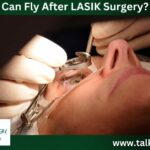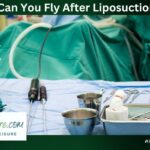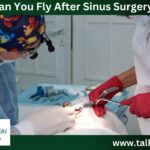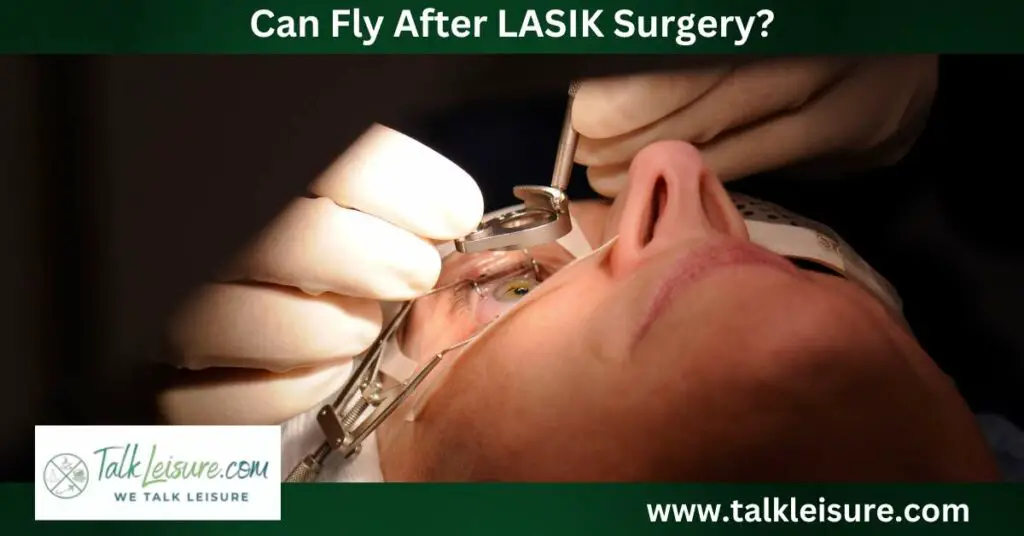Have you been considering cataract surgery but are hesitant because you have upcoming travel plans?
Well, fear not!
Contrary to popular belief, you can indeed fly after having cataract surgery.
However, following your doctor’s recommendations and taking certain precautions during your recovery are crucial.
This blog post covers everything you need to know about flying after cataract surgery, including the ideal time to fly, potential complications, and tips to ensure a comfortable and successful trip.
Get ready to explore the skies with clear and improved vision!
Cataract surgery is a common procedure that helps restore vision by removing the cloudy lens in the eye and replacing it with an artificial one.
If you plan to travel by air after the surgery, you might wonder if it’s safe to fly.
The good news is that it’s generally safe to fly after cataract surgery if you take precautions and follow your doctor’s instructions.
It’s important to wait until after your post-operative appointment before you fly, and you may need to check your travel insurance policy to see if there are any conditions surrounding flying after cataract surgery.
If you experience discomfort or vision changes while flying, contact your doctor immediately.
What Is Cataract Surgery?

Cataract surgery is a common procedure for removing cataracts, which occur when the eye’s clear lens becomes cloudy.
It is often performed on an outpatient basis and under local anesthesia.
During the procedure, the surgeon removes the natural lens and replaces it with a clear artificial lens called an intraocular lens (IOL).
The surgery usually takes around 30 minutes, and patients can return to normal activities within a few days.
Laser eye surgeries help solve cataract issues. However, this laser surgery will not treat the need for reading glasses.
Cataract surgery is a safe and effective procedure for improving vision and can allow patients to resume their normal activities, including air travel.
Can You Fly After Having Cataract Surgery?

After cataract surgery, many people wonder whether it’s safe to fly and what the potential risks are.
The good news is that, in most cases, it is safe to fly after cataract surgery.
However, factors such as the type of surgery performed, gas bubbles or other complications, and the individual’s general health must be considered.
Follow-up appointments with your ophthalmologist are essential and should be scheduled around any travel plans.
Artificial tears can help alleviate discomfort from dry eyes caused by the surgery and cabin pressure changes during flights.
As always, consult with your doctor for advice and guidance related to air travel after cataract surgery.
What Are The Potential Concerns Regarding Air Travel After Cataract Surgery?

After cataract surgery, air travel is generally safe unless some unforeseen complications or procedures require air bubbles.
The potential concerns are the impact of cabin pressure changes on the eyes and the anxiety of flying after the surgery.
The Fear Of Flying After Cataract Surgery
For some patients, flying after cataract surgery can be a nerve-wracking and frightening idea.
The fear of flying is common, especially for those recovering from surgery.
Although there is no evidence that flying poses any risks to the eyes after cataract surgery, patients may still experience anxiety or discomfort while on an airplane.
Speaking with your doctor before flying after cataract surgery is essential, as they can offer guidance and advice tailored to your specific needs.
They may recommend postponing air travel until you fully recover or suggest ways to manage discomfort while flying, such as wearing eye drops or protective eyewear.
Sometimes, the fear of flying may be too overwhelming for a patient to manage independently.
In these situations, counseling or support groups can help overcome anxiety related to air travel after cataract surgery.
Impact Of Cabin Pressure Changes On The Eyes
As an airplane ascends, the air outside becomes sparse, so airplanes pressurize their cabins.
This means that the air pressure inside the plane is lower than the normal atmosphere’s air pressure.
Cabin pressure changes can affect your eyes, particularly if you have had eye surgery, such as cataract surgery.
At the altitude at which planes fly, the humidity is less than 1%, so the air coming into the cabin is very dry, which causes our eyes and skin to dry out more quickly.
This can cause discomfort, irritation, and even dryness.
Keeping your eyes clean and lubricated is important to help the healing process, especially during air travel.
What Are Factors To Consider For Post-Cataract Surgery Air Travel?

Air travel is generally safe after cataract surgery, but some factors must be considered before flying.
The Healing Time Of Cataract Surgery
After cataract surgery, allowing your eyes to heal properly before resuming normal activities is important.
The length of the healing process can vary depending on the individual and the specific type of surgery performed.
Generally, full healing can take anywhere from four to six weeks.
During this time, keeping the eye clean and lubricated is important to aid in the healing process.
Activities should be limited to give the eye time to rest and heal properly.
Similar to cataract surgery, hip replacement may also take takes four to six week to heal. So you must wait at least four weeks before taking long flights.
Eye Health And Stability
With advancing age, the eyes also undergo changes, including the formation of cataracts.
Getting cataract surgery is a necessary step for patients to restore their vision.
However, taking care of your eyes after the surgery is equally important.
Avoid rubbing your eyes or touching them with unclean hands, which can lead to irritation.
Rest your eyes as much as possible, and do not strain them while reading or watching television.
Maintain a healthy diet rich in vitamins and minerals, especially those beneficial for eye health, such as vitamin A, lutein, and zeaxanthin.
Medications And Eye Drops
After cataract surgery, your doctor may prescribe medications and eye drops to help with pain and inflammation and prevent infection.
Following your doctor’s instructions and taking your medication as prescribed is essential.
Remember to check with your doctor about any potential side effects or interactions with other medications you may be taking.
One common medication used after cataract surgery is an antibiotic eye drop to prevent infection.
Your doctor may also prescribe steroid eye drops to reduce inflammation.
Eye drops containing preservatives can irritate the eye, so your doctor may recommend preservative-free options.
Additionally, using artificial tears can help alleviate dry eye symptoms after surgery.
Remember to keep your eye drops and medication with you when traveling and use them as directed.
Follow-up Appointments Before Flying
After cataract surgery, attending all follow-up appointments with your ophthalmologist is important, especially before flying.
These appointments help evaluate your progress and detect any complications.
If you plan to take a trip soon after your surgery, inform your doctor and try to schedule your appointments around your travel schedule.
Following your surgeon’s post-surgery instructions, such as using eye drops and a sleep mask, can help protect your eyes during travels.
Adhering to post-surgery instructions and attending follow-up appointments before flying can ensure a more comfortable and safe travel experience.
What Are The Risks Of Flying After Cataract Surgery?

When flying after cataract surgery, the risks depend on your surgery type and whether there were any complications.
It’s always best to check with your ophthalmologist or eye surgeon and get their recommendation before flying.
Here are some risks to keep in mind:
1. If you had a gas bubble injected during your surgery, you should not fly until your ophthalmologist confirms the bubble has dissipated.
Changes in pressure during the flight could cause the bubble to expand and have serious repercussions for the eye.
2. Dry eyes are a common side effect of cataract surgery, and the low humidity of airplane cabins can exacerbate this.
Be sure to use artificial tears or bring a sleep mask to keep your eyes lubricated during the flight.
3. Infections are rare but can occur after any surgery, including cataract surgery.
If you experience worsening vision, redness, or pain in the eye after flying, seek medical attention immediately.
Are There Any Insurance Coverage Policies When Flying After Cataract Surgery?

You must check with your policy or provider for insurance coverage and travel assistance after cataract surgery to determine any potential restrictions or exclusions.
Some policies may require a minimum time between surgery and the start of your trip for eligibility.
Additionally, certain policies may exclude coverage for medical expenses related to cataract surgery.
However, according to Discover Vision, cataract surgery typically does not affect travel insurance, and most people can fly without any problems after the surgery.
However, discussing early postoperative air travel with your ophthalmologist is recommended to ensure safe and proper healing.
With proper precautions and communication with your doctor and insurance provider, flying after cataract surgery should not be a major concern.
Conclusion
In conclusion, it is safe to fly after cataract surgery.
The altitude and pressure inside an airplane cabin will not harm your eyes.
However, it is important to pack eye drops, your doctor-prescribed other medications, and your eye shield to protect your eyes from getting dry.
It is also crucial to follow up with your doctor after surgery.
Expect to visit your doctor’s office the day after your cataract surgery and again five to eight days after surgery.
During these visits, your doctor will evaluate your eyes to ensure they are healing properly and look for any signs of complications.
If you have travel plans shortly after your procedure, inform your doctor and try to schedule your appointments around your travel plans.
Always follow your doctor’s recommendations during recovery, including using eye drops and a sleep mask to protect your eyes.
FAQs
Do I Need To Wear Glasses When Flying After Cataract Surgery?
After cataract surgery, patients may wonder if they need to wear glasses when flying.
It is generally safe to fly after cataract surgery, but it is important to maintain post-operative visits and follow your doctor’s recommendations.
While wearing glasses is not mandatory, it may help protect your eyes from the sun and provide additional comfort during the flight.
Can I Fly Two Weeks After Cataract Surgery?
After cataract surgery, many patients wonder when they can travel safely by air.
Discover Vision says most people can fly without problems after cataract surgery.
While it is generally safe to fly after 24 hours, full recovery takes around four to six weeks.
During this time, the eye needs rest and should be kept clean and lubricated to help heal.
Can I Take Long Flights After Having Cataract Surgery?
It is natural to feel concerned about the safety of air travel after cataract surgery.
Most patients can fly after cataract surgery, though the timing may differ depending on the type of procedure.
In general, waiting until your doctor clears you for everyday activities and attending all follow-up appointments is recommended.
Ultimately, it is best to talk to your ophthalmologist to determine the safest time for air travel.












